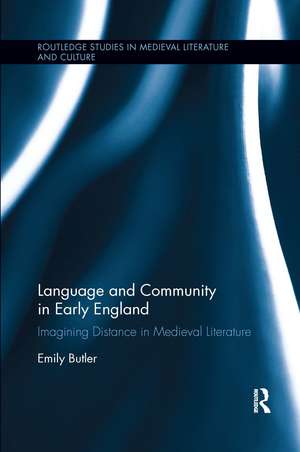Language and Community in Early England: Imagining Distance in Medieval Literature: Routledge Studies in Medieval Literature and Culture
Autor Emily Butleren Limba Engleză Paperback – 30 sep 2020
| Toate formatele și edițiile | Preț | Express |
|---|---|---|
| Paperback (1) | 258.70 lei 6-8 săpt. | |
| Taylor & Francis – 30 sep 2020 | 258.70 lei 6-8 săpt. | |
| Hardback (1) | 1000.27 lei 6-8 săpt. | |
| Taylor & Francis – 5 mai 2017 | 1000.27 lei 6-8 săpt. |
Din seria Routledge Studies in Medieval Literature and Culture
-
 Preț: 389.66 lei
Preț: 389.66 lei -
 Preț: 443.69 lei
Preț: 443.69 lei -
 Preț: 389.66 lei
Preț: 389.66 lei -
 Preț: 469.34 lei
Preț: 469.34 lei - 17%
 Preț: 256.67 lei
Preț: 256.67 lei -
 Preț: 251.32 lei
Preț: 251.32 lei -
 Preț: 389.66 lei
Preț: 389.66 lei - 17%
 Preț: 269.00 lei
Preț: 269.00 lei -
 Preț: 383.50 lei
Preț: 383.50 lei -
 Preț: 382.91 lei
Preț: 382.91 lei -
 Preț: 383.89 lei
Preț: 383.89 lei - 20%
 Preț: 276.70 lei
Preț: 276.70 lei -
 Preț: 381.98 lei
Preț: 381.98 lei -
 Preț: 386.61 lei
Preț: 386.61 lei -
 Preț: 390.41 lei
Preț: 390.41 lei -
 Preț: 389.66 lei
Preț: 389.66 lei -
 Preț: 389.66 lei
Preț: 389.66 lei - 17%
 Preț: 257.25 lei
Preț: 257.25 lei -
 Preț: 389.66 lei
Preț: 389.66 lei -
 Preț: 389.66 lei
Preț: 389.66 lei -
 Preț: 385.04 lei
Preț: 385.04 lei - 18%
 Preț: 1109.18 lei
Preț: 1109.18 lei -
 Preț: 385.47 lei
Preț: 385.47 lei - 18%
 Preț: 1000.76 lei
Preț: 1000.76 lei
Preț: 258.70 lei
Preț vechi: 310.75 lei
-17% Nou
Puncte Express: 388
Preț estimativ în valută:
49.50€ • 51.82$ • 40.96£
49.50€ • 51.82$ • 40.96£
Carte tipărită la comandă
Livrare economică 05-19 aprilie
Preluare comenzi: 021 569.72.76
Specificații
ISBN-13: 9780367667856
ISBN-10: 0367667851
Pagini: 212
Dimensiuni: 152 x 229 mm
Greutate: 0.39 kg
Ediția:1
Editura: Taylor & Francis
Colecția Routledge
Seria Routledge Studies in Medieval Literature and Culture
Locul publicării:Oxford, United Kingdom
ISBN-10: 0367667851
Pagini: 212
Dimensiuni: 152 x 229 mm
Greutate: 0.39 kg
Ediția:1
Editura: Taylor & Francis
Colecția Routledge
Seria Routledge Studies in Medieval Literature and Culture
Locul publicării:Oxford, United Kingdom
Public țintă
Postgraduate and UndergraduateCuprins
Introduction: Community and Distance
Chapter 1: Latinity and the English People
Chapter 2: Crafting a Textual Kingdom in Wessex
Chapter 3: Preaching and Politics in a Time of Conquest
Chapter 4: Old and Newer English in the West Midlands
Chapter 5: Shewing the Auncient Fayth: An Elizabethan Sequel
Conclusion
Chapter 1: Latinity and the English People
Chapter 2: Crafting a Textual Kingdom in Wessex
Chapter 3: Preaching and Politics in a Time of Conquest
Chapter 4: Old and Newer English in the West Midlands
Chapter 5: Shewing the Auncient Fayth: An Elizabethan Sequel
Conclusion
Notă biografică
Emily Butler, Assistant Professor of English at John Carroll University, USA, is an Anglo-Saxonist working on attitudes to language and how such attitudes shape textual communities and impinge on textual production. Recent work includes articles and papers on the Old English Prose Psalms, Matthew Parker's medieval collection, and the Encomium Emmae Reginae.
Descriere
This book examines the development of English as a written vernacular and identifies it as a process of community building that occurred in a multilingual context. Moving from the 8th-13th centuries, to the 16th-century antiquarians who collected medieval manuscripts, it suggests that this period in the history o
